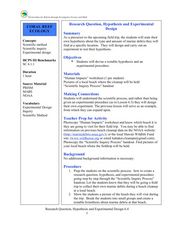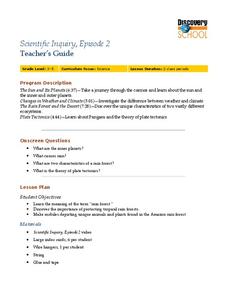Curated OER
Mixed Up Chameleon
Students discover facts about chameleons. In this adaptations lesson plan, students read a book about chameleons and discuss the adaptations they have to survive. Students also discuss predator and prey of the chameleon. Students make...
Curated OER
On The Go! Forces and Motion
Learners create a car using physics. In this forces and motion lesson, students create a car and test which changes in design change the performance of the car. Learners complete a graphic organizer with the different changes they see.
Curated OER
Where are Koalas on the Food Chain?
Take a field trip to observe Koalas, absolutely! Budding scientists become familiar with the Koala's position in the food chain. They answer questions based on what they see and draw a food chain explaining the Koalas position. Tip: A...
Curated OER
Applying KWL Guides to Sources with Elementary Students
What is a KWL chart? Here is a well thought-out lesson that has learners use KWL charts to gain historical perspective. Your class examines primary sources about historical events and identifies what they know, want to know, and,...
Curated OER
Good Apples
Students investigate diversity. In this diversity lesson, students look at a variety of apples in order to compare and contrast their physical characteristics. They apply the concept to people by listing how people are the same and...
Curated OER
Sweet Clara and the Freedom Quilt: The Real Story
Students learn how slaves communicated with each other. In this slavery and freedom instructional activity, students learn how slaves used quilts as maps, learn what different quilt patterns meant, draw a picture for their class freedom...
Curated OER
Cultural Environment
Students learn about a new culture. In this Native American environment lesson plan, students begin a unit on Native Americans where they learn about their homes and the environment they lived in. Students view pictures of Native...
Curated OER
Deep Impact's Comet on a Stick!
Students create a model of a comet. In this space science lesson, students compare their model to the characteristics of a real comet. They evaluate and make necessary modifications to their original design.
Novelinks
Zach’s Lie: The K-W-H-L Strategy
The attached resource is no lie! The K-W-H-L activity, which is fourth in a series of seven, serves as a pre- and post-assessment. First, pupils brainstorm what they know about a specific topic, then they list what they want to know, how...
National Center for Case Study Teaching in Science
A Strange Fish Indeed
Communication is one of the most important aspects of science. In a two-day activity, your high school or college-level biologists will read excerpts from a fictional diary of Marjorie Courtenay-Latimer, the woman who discovered the...
Carolina K-12
World War II through the Radio Waves
Young historians channel the very medium used to convey news during World War I. They create and present a five-minute radio broadcast on a particular topic from the war, such as the roles of African Americans and women, war bonds,...
Lerner Publishing
Teaching Habitats
What makes up a habitat? Use this resource to engage first graders in the exploration of desert, wetland, forest, and ocean habitats. Youngsters classify plants and animals into the four distinct habitats through drawings and cutting and...
Novelinks
The Martian Chronicles: Double-Entry Journals
Teach learners to reflect on their reading with a lesson about double-entry journals. As they read Ray Bradbury's The Martian Chronicles, class members note interesting passages from the text on the left side of their page, and jot down...
Education Development Center
Micro-Geography of the Number Line
Young mathematicians dive into the number line to discover decimals and how the numbers infinitely get smaller in between. They click the zoom button a few times and learn that the number line doesn't just stop at integers. Includes a...
Concord Consortium
Deformed Electron Cloud
Dispel the misconception that atoms are always little round balls! Illustrate changes in the electron cloud with an entertaining interactive. Pupils push and pull on the cloud by altering the charge on plates located on either side of...
National Library of Medicine
Your Environment, Your Health: The Great Debate—Bottled Water vs. Tap Water in Our School
Should bottled water be sold in schools, or should they only provide tap water? The summative unit in the six-part series encourages scholars debating this topic. The lessons teach how to build an argument, how to gain background...
Colorado State University
Why Are Clouds White?
Is it possible to change the color of clouds? A three-part activity explores the scattering of light by the water droplets that make up clouds. After observing a demonstration, curious scholars conduct their own investigations of the...
NASA
Exploring Data
Bring the sun to your class! Young scholars analyze actual solar wind data in the second lesson of a five-part series. Their analysis includes speed, temperature, and density data.
Chemistry Collective
Virtual Lab: DNA Binding Problem
Why do the bases in DNA pair up the way they do? Unravel the mystery of the double helix in a virtual lab. Young scientists follow in the footsteps of Watson and Crick to determine the free energy associated with DNA base pair binding....
American Psychological Association
Resource Vetting Rubric
How do you assure that the resources you find for your classes are of good quality? Check out a vetting rubric that suggests eight questions to ask when considering lesson plans, activities, demonstrations, and pictures for classroom use.
US National Archives
Eastern Europe 1939-45 — Stalingrad
Acts of civilian courage in Great Britain—and in one case, the island of Malta—often receive the George Cross, instituted by King George VI at the beginning of World War II. After the valiant defense of Stalingrad by its inhabitants,...
DocsTeach
Benjamin Franklin: Politician and Diplomat
Benjamin Franklin was many things: a scientist, businessman, diplomat, politician. Learners explore facets of the legendary figure with a matching activity. By matching primary source documents to their descriptions, they analyze the...
Curated OER
Research Question, Hypothesis and Experimental Design
Learners discuss steps of the scientific process, as well as, observe a picture of the beach that they will visit. Students create a testable hypothesis about marine debris at the beach. In this science lesson plan, learners create a...
Curated OER
Rain Forest
Young scholars study the Amazon tropical rain forest. In this rain forest lesson, students discuss the Manu Biosphere reserve and watch a video about conserving the rain forest. Young scholars create mobiles for the rainforest that...
Other popular searches
- Science Inquiry Lessons
- Chemistry Inquiry Lessons
- Math Inquiry Lessons
- Guided Inquiry Lessons
- Inquiry Lessons on Rocks
- Life Science Inquiry Lessons
- Health Inquiry Lessons
- Drug Inquiry Lessons
- Inquiry Lessons on Plants
- Inquiry Lessons English
- Inquiry Lessons Plants
- Genetics Inquiry Lessons

























